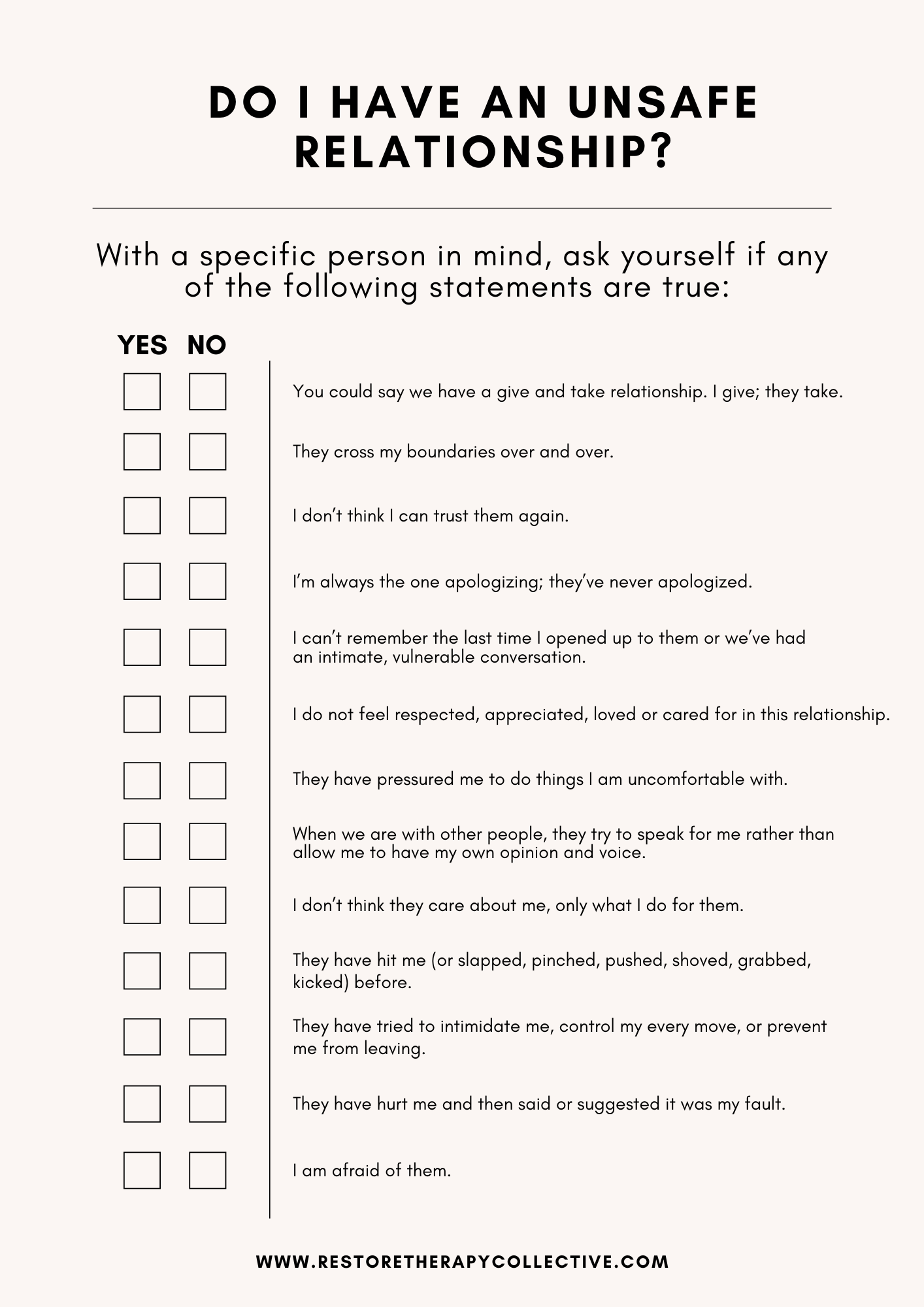Do You Need Safer Relationships?
I’m going to come right out and say it:
some of your relationships might not be very good for you.

And when I say “relationships”, I don’t just mean romantic relationships or intimate relationships, I mean out of all your relationships with friends, family, and (yes) significant other / partner / potential mate / spouse, some are likely unsafe.
Do you have unsafe relationships?
You might be wondering, “I don’t know… do I? What makes a relationship unsafe?”
Well, let’s talk about it.
Let’s Start with Safe
Our ideal for all our relationships—good, healthy, mutually empowering, cherished—is more than categories of Safe and Unsafe, but surrounding ourselves with safe relationships should be the absolute starting point!
We tend to think about safety as being a physical thing. This goes back to our childhood. Don’t touch the stove (it will burn you). Don’t play with the knife (it will cut you). Look both ways before crossing the street (so that you don’t get hit by a car).
But safety is more than physical. We learned this also as children (we sometimes forget it as adults). Being alone in the dark felt dangerous. Was it actually dangerous? Maybe not, but it felt dangerous. And what made a school bully unsafe? Did a bully have to hit other kids to be thought of as a bully?
Unsafe can be physical. Unsafe can be emotional and relational too.
I’d like us to shift our thinking a bit. Instead of asking, “Is my body in danger of being harmed?” let’s ask, “Is my person in danger of being harmed?”
So, we need to take a look at what makes a relationship unsafe.
What Makes a Relationship Unsafe
Unsafe relationship behaviors can range in type (physical, nonphysical), frequency (how often), duration (how long), and intensity (how bad).
Here are some examples:
- Self-centered motivation (the person only cares about what they want and need)
- Lack of respect (your feelings/needs/thoughts/boundaries are not important)
- Not understanding what appropriate boundaries are
- Lack of empathy (when someone else or life has hurt you)
- Lack of remorse (when they have hurt you)
- Inability to apologize
- Emotional abuse (includes: verbal abuse—belittling and criticizing, manipulation, intimidation, humiliation/degradation, gaslighting, crazymaking, emotional distancing and isolating)
- Physical abuse and violence
- Sexual abuse and coercion
Unsafe relationship behaviors are problematic. Trust, intimacy, connection, and even our basic health and wellbeing are on the line when we regularly engage in relationships that are unsafe. So, let’s do a quick scan of your relationships and determine if some are unsafe.

Alright, so how many “yes” answers do you have? If it’s even one “yes” we should call that relationship unsafe for now.
*Repeat the process with as many relationships as you desire.
What a Safe Relationship Feels Like
How are your 4 “C”s? In a safe relationship I can expect our connection to be authentic, our communication to be respectful, our conflict to be aimed at growth and healing, and our closeness to be deepening with time.
I experience a safe relationship as being mutually empowering. I know in a safe relationship my personal boundaries are respected. I can trust in a safe relationship this person will not hurt me intentionally. I am generally better for having this person in my life.
A Safe person:
- cares about me
- does not want to see me hurt
- does not intentionally hurt me
- respects my personal boundaries
- allows me to be my authentic self
- is authentic with me
- is honest and trustworthy
- listens attentively when I share and even asks questions
- enjoys spending time with me
- apologizes sincerely and attempts to repair the relationship
- wants to see me grow
- wants what is best for me
- is trying to grow (be healthier) themself
Do you notice the difference? What makes a person safe for us is not only the absence of the unsafe behaviors but also the presence of a whole lot of good.
An Abusive Relationship is the Most Unsafe Relationship
This post is about safe relationships in general, with anyone and everyone around us—family, friends, and intimate relationships—, and not abusive relationships specifically. But an abusive relationship is an unsafe relationship pushed to the extreme. If you are actively being abused by a spouse, partner, or someone in your home, you need to seek immediate help.
Not everyone who experiences unsafe relationships is experiencing abuse, but you might be.
If you’re not sure if what you’re experiencing qualifies as abuse, go to https://www.thehotline.org/identify-abuse to learn the signs.
If you need help getting to safety you can contact the National Domestic Violence Hotline by going to that same website https://www.thehotline.org/get-help, calling 1-800-799-SAFE (7233), or texting “start” to 88788 to get help anytime (24 hours a day, 365 days a year).
What Now?
Learning what makes relationships Safe and Unsafe is not enough. Labeling some of our relationships Safe and some Unsafe is not enough. We want to increase our sense of safety and security where we can, and we want to attract and collect more safe relationships.
We could easily assume that if we have one safe relationship—one person who cares about us, one person who is in our corner, one person who has our back—that it’s enough. But it’s not really. We need more safe relationships than unsafe. We need enough safe people surrounding us to regularly sustain us.
And when it comes to intimate relationships—unsafe relationships are simply unacceptable.
Can you answer “yes” to any of these questions?
- Yes, I have more unsafe than safe relationships
- Yes, I am tired of being hurt / stepped on / taken advantage of
- Yes, I want attract more safe people
- Yes, I want better relationships
- Yes, I want to figure out how to change or leave some of my relationships
Are you ready to get started? We’re ready too. Contact us at 616-228-9244 or submit a secure contact form to get scheduled with a Restore therapist today!
Bryan R. Wisdom, MDiv, MA, LLMFT is a therapist with Restore Therapy Collective (100% telehealth), and has been involved in helping work for 19+ years. His personal mission is the help others live authentically, make better decisions, develop healthier relationships, and adventure beyond impossible. He loves his wife and kids, counseling, learning, comedy, strategy board games, travel, and outdoor adventures.
Restore Therapy Collective



